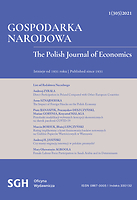Ewolucja logiki instytucjonalnej w reformowanym
systemie szkolnictwa wyższego w Polsce
The Evolution of Institutional Logic in Poland’s Higher Education System under Reform
Author(s): Piotr UrbanekSubject(s): Transport / Logistics
Published by: Szkoła Główna Handlowa w Warszawie
Keywords: neo-institutional theory; public university; higher education reform
Summary/Abstract: Neo-institutional theory highlights the impact of the institutional environment on organisations. This leads to the emergence of homogeneous institutional structures due to the existence of a dominant institutional logic that is an independent determinant of organisational processes. University reforms focused on marketisation mean that the institutional logic associated with academic governance needs to undergo an evolution. The success of university transformation depends on whether a new logic referring to the idea of managerialism and based on the principles of strong leadership can be reconciled with an academic logic based on collegial decision-making processes. In the empirical part of the article, the author assesses changes in the management structures of Polish universities that are a result of reforms to the higher education system. Based on an analysis of the statutes of 36 public universities, two groups of universities have been identified, those that try to maintain the conservative academic status quo, and those that adapt their authority structures to a changing institutional environment. The results show that the scale of changes is determined by the prestige of a university. While highly-rated universities are trying to maintain traditional academic authority structures, lower-ranked universities are more likely to implement ideas typical of a managerial institutional logic.
Journal: Gospodarka Narodowa. The Polish Journal of Economics
- Issue Year: 302/2020
- Issue No: 2
- Page Range: 95-122
- Page Count: 28
- Language: Polish

